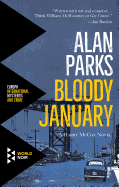
Harry McCoy grew up in a children's home, is prone to drunkenness, takes speed, likes to use his fists, romances a heroin-addicted prostitute and consorts with criminals. He has more in common with the crooks he chases than with his fellow detectives on the Glasgow Police Force.
On January 1, 1973, McCoy is summoned to Barlinnie prison by an inmate with a tip: a young waitress named Lorna will be killed the following day. Although he's on the scene on January 2, McCoy can't stop a teenager named Tommy Malone from fatally shooting Lorna and then himself at a bus station. McCoy has previously tussled with the wealthy Dunlop family, for whom Tommy was working as a groundskeeper. Now he's forced to grill Jimmy Gibbs, the former dirty cop running the Dunlop house; more gallingly, Gibbs is dating McCoy's ex. After another young woman--like Lorna, a turner of tricks--is murdered, McCoy bears down on the Dunlops, knowing full well how "bulletproof the rich really were."
Alan Parks's thrilling debut teeters on a cultural tipping point: heroin is becoming Glasgow's drug of choice, Barlinnie seems to be run by hippies, one of McCoy's love interests is an outspoken feminist, and he can't get behind the new music--embodied by the androgynous David Bowie, who makes a wordless but tasty cameo in the book. Bloody January's classic-noir feel is reinforced by McCoy's reluctance to let go of the past, no matter how badly it treated him. --Nell Beram, author and freelance writer

